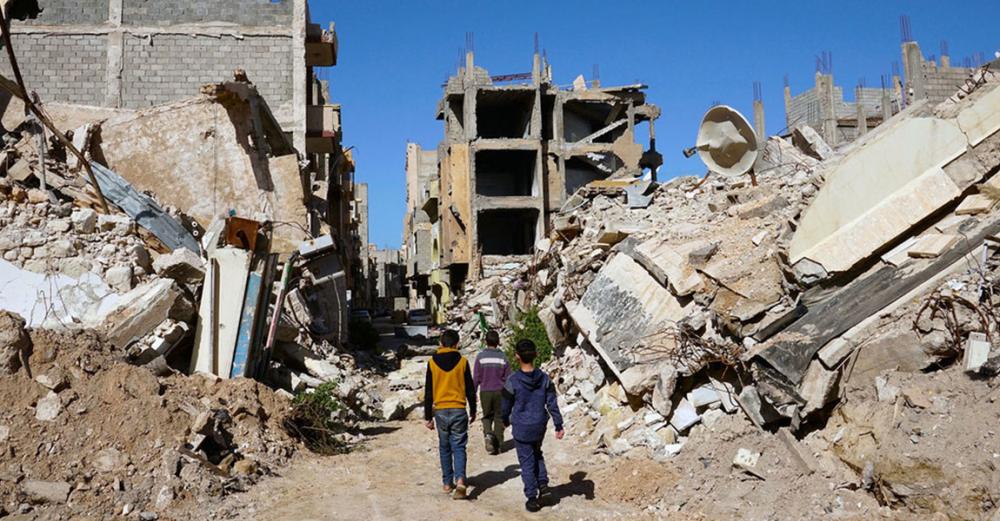Just Earth News | @justearthnews | 09 Jul 2020, 08:09 am Print

New York : With battle lines shifting, foreign interference growing, thousands fleeing their homes and COVID-19 cases on the rise, time is running out for bringing a peaceful end to the conflict in Libya, Secretary-General António Guterres says.
Briefing the Security Council on Wednesday, the UN chief described the context in Libya as “gloomy” – and urged the international community to seize every opportunity to unblock the political stalemate.
“Time is not on our side in Libya”, he told a video-teleconference meeting of the Council that featured statements by several foreign ministers.
‘New phase’ of fighting
“The conflict has entered a new phase, with foreign interference reaching unprecedented levels, including in the delivery of sophisticated equipment and the number of mercenaries involved in the fighting.”
Since the Council last discussed Libya in May, he said, military units of the UN-recognized Government of National Accord (GNA) – “with significant external support” – have pressed eastward in their offensive against the oppositional so-called Libyan National Army, commanded by Khalifa Haftar.
The situation on the frontlines has mostly been quiet since 10 June, with GNA forces 25 kilometres from the Mediterranean coastal city of Sirte, he said.
But the United Nations is very concerned by an alarming military build-up around that city, as well as “a high level of direct foreign interference” in violation of a UN arms embargo, Security Council resolutions and commitments made at the Berlin International Conference on Libya six months ago, he said.
More death and displacement
Meanwhile, almost 30,000 people have been forced to flee their homes due to continuing fighting in Tripoli’s southern suburbs, laid siege to by the LNA more than a year ago, and Tarhouna, bring the total of internally displaced persons in Libya to more than 400,000, he said.
Between 1 April and 30 June, the United Nations Support Mission in Libya (UNSMIL) document at least 356 casualties, including 102 civilian deaths and 254 civilian injuries – a 172 per cent increase compared to the January-to-March period.
Seven-fold increase in COVID cases
COVID-19 is a cause of growing concern, the Secretary-General added, with a seven-fold leap in cases in June alone that brought the total number of confirmed cases to 1,046, with 32 deaths.
“Amid acute shortages of testing kits, the true scale of the pandemic in Libya is likely to be much higher”, said Mr. Guterres, who strongly urged the Libyan authorities to strengthen the nation’s capacity to combat the virus.
Going forward, the Secretary-General said the UN would keep working with the parties to reach a ceasefire and resume a political process to end a crisis of warring factions, and economic collapse, despite the country’s large oil reserves, that is now is in its tenth year.
UN ready to assist
He added that the UN stands ready to help Libya secure and investigate mass graves discovered when GNA forces retook control of Tarhouna, a former Libyan National Army stronghold about 100 kilometres south-east of Tripoli.
He went on to recall that in recent days, he has spoken by telephone with both Prime Minister Faiez Mustafa Serraj and Field Marshall Haftar, strongly appealing to them to ensure an effective ceasefire and to get peace talks rolling.
Guterres acknowledged that the Government of National Accord is calling for national elections, but he cautioned that prospects for Libya-wide polls are fragile, given military developments and support from external backers.
- IDF strikes Hezbollah targets in Lebanon after projectile fire toward Northern Israel; 31 killed
- Pakistan: Armed gunmen kidnap 14 workers during coordinated raids in Balochistan
- ISIS-inspired plot foiled in UK: Two men get life sentences for targeting Jewish community
- India rejects allegations, urges Pakistan to tackle its ‘home-grown ills’
- Massacre in Islamabad: ISIS takes responsibility for deadly Pakistan blast





-1763561110.jpg)
